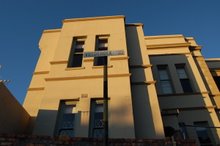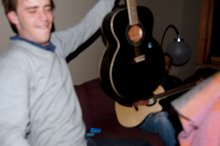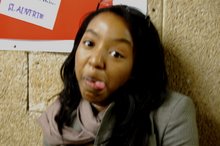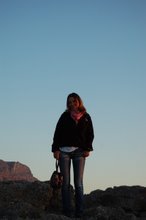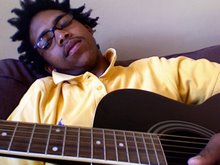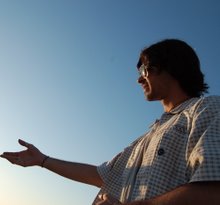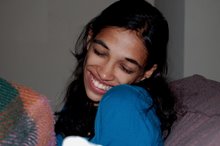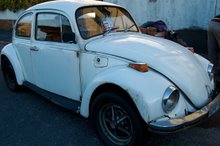The week I arrived at the Democracy House there was plenty of movement, working and talking.
But early yesterday morning the house got emptier, quieter and colder. Amy, our super-polite, beloved friend is now in Rwanda, where she is going to spend a week and then go back home. Amy was the first of our group (the second DH crew) to leave the house.
In spite of our hectic weeks of work and due to living 24/7 together, everyone here became a family in every sense: we shared our activities, helped each other with homesickness, fought for the organisation of the place (yes, we had all the problems a family has as well).
We lose a part of the family when one of our friends leaves us. It is going to happen to all of us. The next to leave the house is Salla on the 16th, and then me on the 17th, Siyi on the 18th.
John stays till the end of the month and so does Charlotte. Yudhvir won't leave so soon because ... well, he lives here in Cape Town!
The team has made a deal to come back in 2010 for the World Cup! Hope everyone keeps their word and makes it back. I'll do my best to meet all of these guys again!
But work goes on and the Democracy House is not completely empty - yet.
/Erick
Thursday, October 11, 2007
DH getting emptier, quieter and colder
Posted by Why Democracy House at 11:54 AM 3 comments
Wednesday, October 10, 2007
Housemates Do Hermanus
On the eve of the Why Democracy? broadcasts, the Democracy Housemates decided to escape the madness of deadlines, broadcast schedules and news posts to get some much needed R&R. Our trip took us to the world famous whale-watching town of Hermanus which is along South-Western Cape coast. Timed perfectly into our busy schedule, the trip was officially the last “excursion” we would have all the housemates attend. This sad realisation along with the persistent bad weather didn’t manage to dampen our spirits (alcoholic ones included). Rain or sunshine we were determined to have a good time.
With the two fires well under way and Erick (fresh out of his eighth shower of the day) making "happy" pineapples, supper was served in time to watch France humiliate New Zealand in the Rugby World Cup. How much more South African could we get I thought, having a braai, watching rugby and drinking beer. Guess there is something to this tradition then as everyone seemed to be content with the evening’s proceedings. With the night still young, we took off to explore the night life and found a Cuban restaurant chain (ironic, I know) that pretty much satisfied Erick’s need for techno beats and late night Fashion TV being broadcast on big screens.
Back by late rainy Sunday afternoon, the Democracy House was still there (not that it can be missed) and just as we left it. Like the house, we were all wet, creaky, a little stale but still standing strong.
Posted by Why Democracy House at 2:36 PM 0 comments
Monday, October 8, 2007
Who Would You Vote for as President of the World?
Since our homepage launched in August, we have had open nominations for candidates that could possibly be a good president of the world.
We closed the nominations in late September and today we opened the Poling Station. 40 people were nominated. We in the house then held internal elections, for the 15 best candidates. We each had to elect 5 people, and give the number points from 1 to 5. So that my first choice got five points, my second got four points and so on and so forth. This produced our list of 15. The list is surprisingly diverse with people (and cartoon characters) from all over the world. Lisa Simpson, Nelson Mandela, David Suzuki and Hilary Clinton, Dalai Lama and Hu Jintao. Former Presidnets and presidential hopefuls, adults and children, entertainers, leaders and beauty queens.
What most impressed me with the list is that is so international. I hope you will all visit the voting room and cast your vote. Who would you rather have rule the world Cheng Cheng or Barak Obama?
To further the effort Erick and I spent Sunday afternoon finding e-mail addresses to our candidates and e-mailed them about the election. So far we have not heard back from any of them, but we invited them to answer the 10 Questioins on our homepage. Most of the peoples direct e-mails obviously were not available online. So we unfortunately have not been able to e-mail Hu Jintao and inform him about our election.
On a personal note I have looked at our list and tried to think about who I would vote for, if I had to vote for an actual president of the world. Maybe I am too inspired by Iron ladies of Liberia. But I honestly think I would vote for Ellen Johnson Sirleaf. She is strong, she is multi-cultural, she believes think in compromising. She believes in listening to both sides of the story before making a decision. She is tough on coruption, she tries to find realistic solutions to societal problems. She demands schools and hospitals for her people and most importantly she is honest!
But of course it is not so important who I would vote for, what is really important is who you would vote for?
I hope you enjoy our election!
Posted by Why Democracy House at 1:58 PM 2 comments
Tuesday, October 2, 2007
Wining, Dining and watching a bear get married on the beach
Yes, you read right: We did watch a bear get married to man in a bridal gown on Clifton beach. But more of that later.
Last Saturday, a few of us from the Democracy House (and a couple of groupies) ventured in the winelands for a day of fun, sun and good wine. Traditionally, our day started two hours after the planned departure time but nevertheless progressed into quite an awesome day. First on the map was the Spier Wine Estate out in Stellenbosch. Originally set around a lake with a few picnic spots of grass for picnic enthusiasts, Spier has turned into a busy tourist destination with a great restaurant, amphitheatre for live concerts and a hotel/spa. After browsing and watching cheetahs laze in the sun we managed to accumulate eight bags of food from the deli and had a rather intimate picnic in the grass. With wine and cheese aplenty, we managed to settle on the windiest spot in the place, but manged to stay planted long enough to eat.
Fully fed, we made our way further into the winelands but unfortunately encountered "Closed for Tasting" signs at a number of farms. Our quest for good wine continued though (thanks to a very helpful assistant at one of the farms), toward the Muratie Wine Farm (who were thankfully open for tasting!). Quenching our desperate need for wine, Muratie provided the most authentic cellar setting. Fascinatingly rustic, we tasted and tasted and tasted among spider webs and faded early twentieth century furniture.
The idea to head toward Clifton for sunset was John's and in an attempt to beat the sunset we moved the day's activities toward Clifton beach. Resembling a scene out of the Wizard of Oz (on Acid), we witnessed a man in a bear suit getting married to a man in a bridal gown. Freaky I know. We only noticed later that there was a camera in the vicinity as well as a director.
We breathed a sigh of relief knowing that it was for some advertisement and that the wine we tasted was not laced with hallucinogenics. With the frisky bear covered, no-one could find an explanation for the guy rolling around under a blanket by himself. Cape Town's a crazy-ass place we concurred. Beautiful as well…but also crazy.
Cheers.
Yudhvir
Posted by Why Democracy House at 3:27 PM 0 comments
Labels: Cape Town , Democrats on Tour , weekend , winelands
Sunday, Sep. 30th2007
Tamara is our close friend in the Democracy House, and her daughter Efredah is, no doubt, everybody’s sweetheart!
Tragically, Tamara’s husband Irvin died of AIDS on Sept. 19, 2007.
We went to attend Irvin’s funeral on Sunday morning, in Crossroads, Nyanga. This is a place very different from downtown Cape Town, and to me much more like Africa. The residents are all black people -- women wearing in colorful long dresses and scarves, carrying babies on their backs or pots on their heads. They live in wooden bunkhouses, poor and small. Some buildings do not even stand straight on the ground. Each house is painted in different colors. Food is cooked alongside the road. I could not tell what the gravy was but it smelled very strong.
The funeral was in the front yard of a small home in a big tent. We were invited to sit in the front. People showed us their friendliness and respect. Salla tried to make a video of it, and a potentially award-winning documentary might come out later. The funeral lasted for 3 hours, I was amazed by the beautiful voices of Xhosa people. They are really born great singers. Then the coffin was buried at noon, in a graveyard not far from the tent. It was that moment I first saw Tamara crying since the bad news arrived more than ten days ago.
Life is full of suffering, but I believe Tamara is a strong Xhosa woman. It is sad but also a relief for her. Life will go on and be better, as long as we believe and never give up.
/Siyi
Posted by Why Democracy House at 12:01 PM 0 comments
Conversations with Alice - or in Denial?
Why? Why? Why do they do this?
This is the question I had when I awoke this morning. Notably it was not "Why Democracy?" nor "Why the hell am I thinking about writing this blog post before I am officially awake and in the line of duty, equipped with caffeine running through my veins to make up for less than 5 hours sleep -- again.".
Words and pictures are stuck in my head: Why do these people stand up? Why do they try, why do they fight a hopeless war just to lose? Why are they so irrationally passionate about their subject that they stand up to organise themselves and to protest loudly, to get engaged in a war they are very unlikely to win, because the opposite side is so powerful, seems so all powerful from their perspective, is so E V E R Y W H E R E. Is their backbone stronger than yours?
Why do women with a good life and armed with not much more than a wired office, their cameras, computers and voices create Shayfeen.com and open up to our documentary filmmakers Leila Menjou and Sherief Elkatsha to show what should be hidden? Why do they expose themselves so easily, becoming nothing more than a moving target for a well trained sniper? It would take so little to make their voices die and even today they can be shot down so fast that no one ever would hear them again. Why do they -- happily and willingly, it seems to me -- endanger their families and beloved ones, their friends and co-workers, to fight? Not enough fighting in their own country, they do not exactly work from the underground: Having a camera and a film maker following them on their journey.
Whether the film is about introducing a totally new subject to 9-year-olds in an elementary school environment or whether they try to document their own government officials keeping them from voting: At the end of the shoot, the tapes and recorded material had to be smuggled out of their countries, leaving the contributors, filmmakers and their families behind as a subject of interest for their own government. The focus changes and within days the observer becomes the observed.
Why do peaceful monks in Burma care enough, why do they gather in order to protest, to die? Why are bloggers and citizen journalists who never had an official story before taking their digital cameras, going out there and documenting what happens to the human rights activists -- whatever it takes? Why is it not enough that people already died for what they believed in? How can one side of the argument be so democratic (monks and demonstrators, peacefully united in their protests) while the other side is so willing, so comfortable -- it seems -- with taking fatal actions against their own citizens? Democracy is no one way street, it can't be!
Why does a documentary filmmaker, living a relatively free and happy life in New York City pick up one of the most personal topics -- his own identity -- and works over more than five years to create a movie he knew from the very beginning, would heat up a controversy that is not only linked to him being Muslim and gay, but to a war that started six years ago? Why does he do this -- fraternizing with people he did not know then, people who share maybe not more than sexual orientation and religious beliefs with him? Why is he willing to face all the threats he knew could arise from this work?
I do not know what answers all those questions for all those wonderful and incredibly brave people, full of integrity and belief in their mission, positive about their impact and the outcome of their efforts. Truth is always a matter of perspective. In cultural debates there is no such thing as an objective truth, a real history.
Is it that these people trust in some form of democracy, of participation, that one can actually have an impact that made them come so far? On the news page of a idealistic project, engaging a huge part of the global community in a debate about what democracy means to them? Is it to awaken people in their comfortable living rooms, in front of their big TV screens, to prove that it takes nothing more than a voice, a strong backbone to actually change things? To questioning your own limits and inspire others to do the same? Not taking action because you are one person, insignificant -- this is a common belief -- can only do so much.
Even though us democrats here in the Democracy House in Cape Town are not exactly working at the front line of it, in the masses of India or Bolivia, facing and questioning religious and political leaders in person -- we all grew during this project with our concept of democracy. These days democracy is not as certain as we, coming from more or less democratic countries all over the world, maybe thought it was. We should not forget that today's democratic countries did not evolve peacefully. They also had to fight their wars for it.
But is seems like as soon as you get involved and engaged in a subject so much bigger than you, it makes things less scary: As soon as you reveal a subject that really matters to you and your co-activists, as soon as you find your own loud voice, an alternative perspective arises: Things start to seem possible. Things start to take shape in front of your closed eyes, lying in your bed, after five hours of sleep. Things you are passionate about. It is an enlightening and empowering process at the same time: As soon as Alice confronted the Wonderland with her own voice she was less scared and the nightmare ended -- leaving her within another world, a new environment, a room full of new chances.
And this is how the Democracy Crew basically ended volunteering a summer in Cape Town: It cost us a summer, a couple of tickets, a lot of sleep. But what did we gain in one small wired house in Cape Town! Friends and a new focus on subjects and food and life. A greater understanding of passion and what it really means to be committed, to stick to an idea or story you think it's worth to be told, no matter what.
A couple of years ago people in pretty safe jobs and offices, spread around the world, decided to take a risk. People who could have been a lot less stressed out in the last years if it wasn't for that decision. Brave people who first had not the means but the agenda to empower others, to create a global forum for debate and to make an extraordinary contribution to this world -- and they made it happen.
Why? There is no correct universal answer for all these questions. All the creative protesters, brave documentarists and artists out there have a personal motivation and that is what makes these issues so diverse and so accessible for a global audience at the same time.
Why? For me the answer is simple and I know it for all the things I am really passionate about: Why? Because some things are worth fighting for.
/Amy
Posted by Why Democracy House at 10:42 AM 1 comments
Labels: activists , democracy , documentaries , human rights , protests
Could it happen without democracy? - Charlotte's trip to New York
Last week I went to New York and as usual I didn’t get to see the Statue of Liberty or go to the Metropolitan Museum of Art. However, I did get to go to Columbia University only three days before Mahmoud Ahmedinejad came to speak to the faculty and students.
I was having coffee with my friend Pablo, when a friend of his, Aries, came by. Aries is the spokesperson is the Queer Alliance at Columbia, he had just been invited to the O’Reilly Factor, hosted by the conservative Bill O’Reilly at Fox News, to give his opinion about Ahmadinjad’s visit. The news had taken an interest, because the Queer Alliance has banned military recruiters from campus because they discriminate against gay people, but yet they allow Ahmadinejad to come and speak, even though he openly denies that there are gay people in Iran. Aries didn’t think he would go on the O’Reilly Factor.
“To be honest what would I say?” he argued and articulately trash-talked the show.
That same night I met up with a bunch of friends, incidentally we all ended up at a Gay bar. One of my friends have just returned from 18 months in Afghanistan. He came a long, even though he is actually not gay. At the entrance he flashed his military ID and was rewarded a free drink. After we left, he related that he had found the entire experience of being at the gay bar very uncomfortable and that he now finally understood what going out was like for women.
The next day I met up with another friend who had just returned from India where she had been working with women on issues of family planning. She was very adamant that it is important to educate and empower the women, because that way you see real change in society.
Sunday I met up with a group of people for brunch. The group was divided between strange-internationals like myself, Jewish Columbia University Graduates and well our soldier friend. Conversation went around the table and eventually ended up on the war. Or the wars. One of the Columbia grads asked what our soldier friend thought about it? He shrugged.
“To be quiet honest” he said “it doesn’t really matter what I think.” He is doing a job.
So Monday I spent the evening watching stand-up comedy. Unfortunately it wasn’t political. It was all about American celebrities. At one point someone made a joke about Oprah, then exclaimed:
“Look at you! You are actually nervous that I’m making fun of Oprah!” Oprah was voted ‘Celebrity most wanted to be President” by the readers of Harpers Bazar’s.
Tuesday Mette Hoffmann and Nick Fraser arrived from Europe, with news that a spread about Why Democracy? would be featured in the Observer the following Sunday and that a small uproar had occurred in Denmark, because the Danish Prime Minister have come forth and said that he would start a revolution if he lived under a dictator.
Wednesday we had the Why Democracy? launched in New York. The screening itself went very well. Nick Fraser and Mette Hoffmann answered questions about the project and I even got to go up on stage at the end and tell everyone to visit the website.
That night I also met Gregory Fitzgerald who is using our outreach as part of a case study for the Center for Social Media at American University and an unidentified flamboyant male did coke behind my back in a restaurant, while assuring my friends and I that he was straight and had more African-American gay friends that any of us.
Thursday, brought me from Manhattan, through Brooklyn and Queens, with a very nice cap driver who let me borrow his cell phone, for the entire 90 minutes I was in his car. I ended up at the John F. Kennedy Airport slightly rushed, with Amazon.com books for John, which had been picked up at the UPS storage in Queens, where according to the employees it is not safe to stand on the street corner.
Then I was back home faster than fast, after about 10 hours of sleep, only interrupted by the fact that someone did not get off the plane when we had our stop over in Dhaka.
Finally I came back to the House. Back to Cape Town. The weather here as in New York is lovely and Sunday we went to a beautiful funeral in one of the Townships. Our wonderful house keeper Tamara’s husband unfortunately passed away last Thursday. The funeral was held in a tent attached to a small house. It was filled to the brim with friends from his church and his family from Malawi who had come down from all over South Africa. During the funeral a small crowd of people also stacked up outside to get a look of us white people.
The last day of this very long week I was standing on the Cape flats under the hot South African sun watching his coffin, decorated with plastic flowers, being lowered into the ground.
Posted by Why Democracy House at 1:38 AM 2 comments
Labels: democracy , funeral , New York , president , USA , war



